

How and Why Using Electronic Devices at Night Can Interfere With Sleep. Ninety percent of people in the U.S. admit to using a technological device during the hour before turning in, and children often use electronic media to help them relax at night.
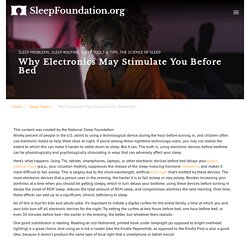
If you’re among these nighttime technology-users, you may not realize the extent to which this can make it harder to settle down to sleep. But it can. The truth is, using electronic devices before bedtime can be physiologically and psychologically stimulating in ways that can adversely affect your sleep. Here’s what happens: Using TVs, tablets, smartphones, laptops, or other electronic devices before bed delays your body’s internal clock (a.k.a., your circadian rhythm), suppresses the release of the sleep-inducing hormone melatonin, and makes it more difficult to fall asleep. This is largely due to the short-wavelength, artificial blue light that’s emitted by these devices. All of this is true for kids and adults alike. One good substitution is reading. Acute exposure to evening blue‐enriched light impacts on human sleep - Chellappa - 2013 - Journal of Sleep Research. Our data indicate that exposure to 2 h of evening blue‐enriched light impacted significantly on the temporal dynamics of sleep EEG activity, such that frontal NREM SWA was reduced during the first NREM–REM sleep cycle, relative to light at 2500 K and 3000 K.
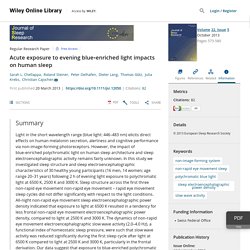
Light and sleep: circadian and homeostatic processes One probable explanation for the blue‐light‐induced reduction in NREM EEG power density in the SWA range, at the beginning of the night, could be through its possible alerting effects. The alerting properties of light during wakefulness rely crucially upon factors such as prior wakefulness, environmental light history and endogenous circadian phase (Chellappa et al., 2011b). The Sneaky Ways That Blue Light Can Interfere With Your Kids’ Sleep. As difficult as it is to get kids to stop watching TV or using their electronic devices before bedtime, there’s a compelling reason to make it happen.
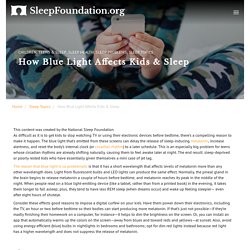
The blue light that’s emitted from these screens can delay the release of sleep-inducing melatonin, increase alertness, and reset the body’s internal clock (or circadian rhythm) to a later schedule. This is an especially big problem for teens whose circadian rhythms are already shifting naturally, causing them to feel awake later at night. The end result: sleep-deprived or poorly rested kids who have essentially given themselves a mini case of jet lag. The reason that blue light is so problematic is that it has a short wavelength that affects levels of melatonin more than any other wavelength does. Light from fluorescent bulbs and LED lights can produce the same effect. Consider these effects good reasons to impose a digital curfew on your kids.
Sleep deprivation: Causes, symptoms, and treatment. The loss of sleep is a common problem in modern society, affecting many individuals at some point in their lives.
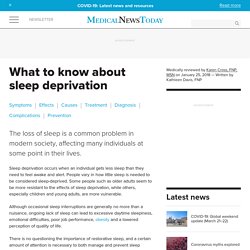
Sleep deprivation occurs when an individual gets less sleep than they need to feel awake and alert. People vary in how little sleep is needed to be considered sleep-deprived. Some people such as older adults seem to be more resistant to the effects of sleep deprivation, while others, especially children and young adults, are more vulnerable. Teens Spending Too Much Screen Time. Mar. 24 -- WEDNESDAY, March 12 (HealthDay News) -- A new survey reports that teenagers spend far too many hours a week in front of TVs and computers, and those in poor neighborhoods have even more "screen time.
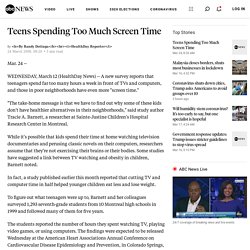
" "The take-home message is that we have to find out why some of these kids don't have healthier alternatives in their neighborhoods," said study author Tracie A. Barnett, a researcher at Sainte-Justine Children's Hospital Research Center in Montreal. While it's possible that kids spend their time at home watching television documentaries and perusing classic novels on their computers, researchers assume that they're not exercising their brains or their bodies. Some studies have suggested a link between TV watching and obesity in children, Barnett noted. In fact, a study published earlier this month reported that cutting TV and computer time in half helped younger children eat less and lose weight. More information To learn more about kids and TV watching, check kidshealth.org. Age and Sleep: How our sleep changes from childhood to adulthood.
Age and sleep are closely related, and many people will notice a significant decline in the quality of sleep as they grow older.
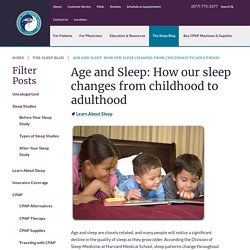
According the Division of Sleep Medicine at Harvard Medical School, sleep patterns change throughout life, and for most of us, the amount of time we spend sleeping each day slowly decreases as we age. Two main types of sleep There are two main types of sleep: REM (rapid-eye movement) and NREM (non-rapid-eye movement). Sleep And Social Media: New Study Finds Link Between Facebook Use And Lack Of Sleep. It’s becoming more apparent than ever that our addiction to social media has become a detriment to our health.
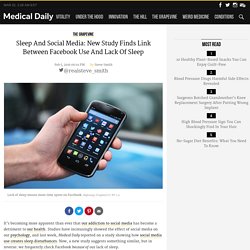
Studies have increasingly showed the effect of social media on our psychology, and last week, Medical Daily reported on a study showing how social media use creates sleep disturbances. Now, a new study suggests something similar, but in reverse: we frequently check Facebook because of our lack of sleep. Led by Gloria Mark, an informatics professor at the University of California, Irvine (UCI), the new study is set to be presented at the ACM Computer-Human Interaction Conference in May 2016. Sleep deprivation: Causes, symptoms, and treatment. Social Media Use May Mess With Teens’ Sleep. Social media has been plagued with bad publicity in recent years, and with pretty good reason.
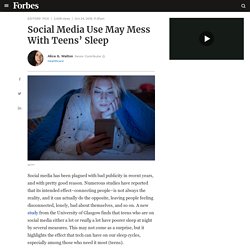
Numerous studies have reported that its intended effect–connecting people–is not always the reality, and it can actually do the opposite, leaving people feeling disconnected, lonely, bad about themselves, and so on. A new study from the University of Glasgow finds that teens who are on social media either a lot or really a lot have poorer sleep at night by several measures.
This may not come as a surprise, but it highlights the effect that tech can have on our sleep cycles, especially among those who need it most (teens). The study was published this week in the journal BMJ Open. Is social media disturbing your sleep? Social media has revolutionised how we interact with the world, allowing us all to stay connected and to share ideas and other forms of self-expression.
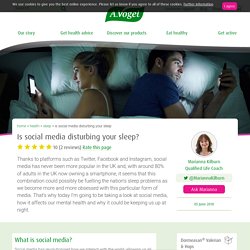
Social Media and Sleep. Last updated July 31, 2019 Two hallmarks of modern society are social media use and sleep issues.
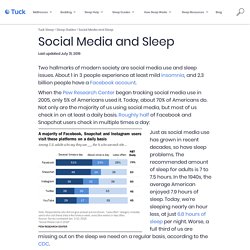
About 1 in 3 people experience at least mild insomnia, and 2.3 billion people have a Facebook account. When the Pew Research Center began tracking social media use in 2005, only 5% of Americans used it. Today, about 70% of Americans do. Heavy social media use linked to poor sleep. Image copyright Getty Images Teenagers using social media for more than three hours a day are more likely to go to bed after 23:00 and wake during the night, UK research suggests. This affects one in three teens - with one in five spending five hours or more on apps like Instagram, WhatsApp and Facebook every day, the study said. The University of Glasgow researchers said 13 to 15 year-olds may be delaying bedtime by being on their phones. Psychiatrists say screens should be avoided in the hour before bed. Body-clock changes But the study, of 12,000 teenagers, recognised that getting them off their phones could be "especially challenging" because it was a time of growing independence, when keeping in touch with friends was important.
Teenagers who were very high social-media users (five hours or more per day) were around 70% more likely than average users (one to three hours) to fall asleep late on school nights and after midnight on other days.